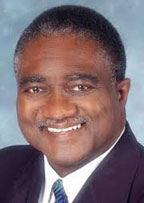
Mr. Wade and the ‘First Family of the housing projects’
By George E. Curry, NNPA Columnist
Approximately three weeks ago, I suffered a mild heart attack. Shortly afterwards, Mr. Robert T. Wade, a longtime family friend in Tuscaloosa, Ala., died at the age of 94. Against the advice of close friends and even some relatives, I attended his funeral last Saturday.
To appreciate why I was determined to attend Mr. Wade’s funeral, you have to understand what Mr. Wade meant to me and thousands of Black kids who grew up in the housing projects during the 1950s and 1960s. Most Black communities have a Mr. Wade, a universally respected adult who adopts every child in the community as his own.
As I said in my tribute to him at the funeral, we considered the Wades the “First Family of the Housing Projects.” Of course, Mr. Wade was the president and his wife, Mrs. Ella Wade, was the First Lady. To those of us who lived in McKenzie Court, my all-Black housing project, they were our Kennedys. They were royalty and we wanted to be like them.
Of the seven Wade children, two of them were males – Archie and Harold. Archie was the oldest and seven years my senior. Harold was five years older than me, about the same age as my youngest uncle, Jesse Harris. The three were the brothers I never had.
Hal and Archie were standout athletes and even played professional baseball. But they were scholars first. Mrs. Wade and the girls – Ethel Jean, Glenda, Janice, Phyllis and Karen – in addition to being beautiful, were classy and always exuded class.
And if you happened to be at 73-B McKenzie Court around dinner time, which many of us skillfully managed to do, somehow Mrs. Wade had cooked enough food to accommodate young people like me who wanted to get as close to royalty as possible.
Mr. Wade was the first Black businessman that I knew. He established Wade Printing Co. in 1953 and most of my life it was on what was then 32nd Avenue, now Dr. Martin Luther King, Jr. Blvd. It was on our route from McKenzie Court to Druid High School. So, every school day, we walked past his shop going to and from school; many times he would be standing outside, which was an open invitation for us to stop by and talk.
For those of us who did not grow up with our biological father, Mr. Wade cast an even larger shadow. He became daddy, teacher, counselor and role model, all rolled into one. I can’t think of a time I did not know Mr. Wade. Nor can I think of a time when he was so busy that he didn’t immediately stop what he was doing to talk to me and any other kid who sought his advice. Mr. Wade didn’t just offer us words, he provided the example of how to live a moral, blemish-free, admirable life.
As I reflect on his life, I am amazed about how many times Mr. Wade encouraged me even after I became an adult. When Charles Steele, a childhood friend, first became president of the Southern Christian Leadership Conference (SCLC), he presented us with a president’s award. I was honored just to have my name mentioned in the same breath as Mr. Wade’s. When I gave a commencement address at Alabama A&M University, where he attended and roomed with future civil rights icon Joseph Lowery, Mr. Wade was one of the first persons to greet me when I exited the stage.
One time I was back in Tuscaloosa and had just completed an interview at WTUG, the local Black radio station. When I left the studio, there waiting for me was Mr. Wade. Yes, I was one of his boys and as one of his boys, you never wanted to disappoint him. Instead, you wanted to make him proud, you wanted him to know that all of the time and wisdom that he shared with you was not a waste of time.
When I listened to others at Weeping Mary Missionary Baptist Church share memories of this impressive man, his accomplishments were remarkable in breath. For me, his greatest contribution was the impact he had on young African Americans, especially boys, during an era of racial segregation. When so many people in society were telling us we couldn’t accomplish anything because we were Black, Mr. Wade convinced us that we could do anything that we could imagine. He reminded us that we would have to work twice as hard to get half the recognition, but we could beat the odds and take our rightful place in the world.
Mr. Wade has left us physically, but a part of him remains buried deep in our hearts. He was our shinning example. And just like we didn’t want to disappoint him in life, we won’t disappoint him in death, either.
